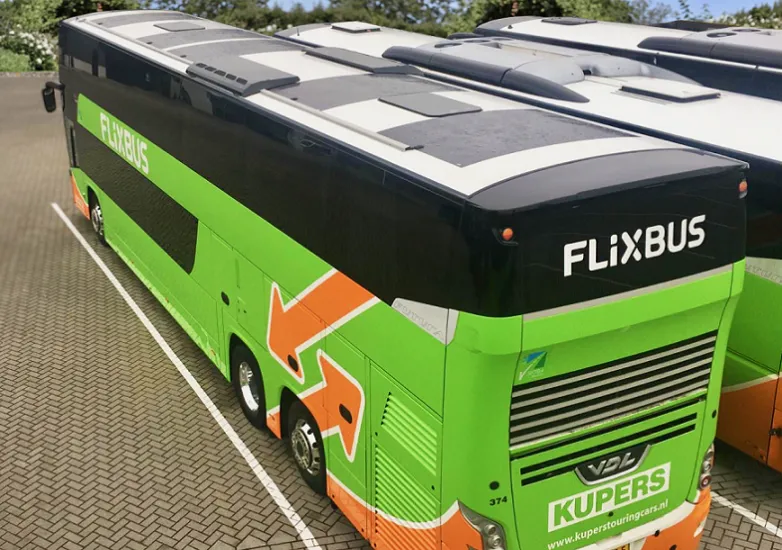Flixbus fleet examinations 18% CIGS panels
- After announcing plans to test hydrogen fuel cell buses in November, the European coach travel route planning start-up has begun a pilot project to reduce diesel consumption by using solar panels on the vehicles of its partner companies. FlixBus says the ultra-thin, lightweight CIGS modules help save 1.7 litres of diesel per 100km.

The German FlixMobility start-up behind the green-liveried FlixBus brand has begun testing copper indium gallium selenide (CIGS) solar panels on the buses operated by its partners in an effort to reduce diesel consumption and CO2 emissions.
The panels will provide energy for vehicle electricity needs and the first modules are being tested on the Dortmund to London route.
FlixMobility said the ultra-thin, lightweight panels used – provided by U.K. specialist Trailar – do not create air resistance.
Using a smart charge controller, the panels are connected to the bus alternator, which can recharge a vehicle battery with limited fuel requirements. "During the trial period, an average of 1.7 litres of diesel was saved per 100km [travelled]," the bus route planning company stated.
Munich-based FlixMobility said the CIGS panels will entirely power the pilot vehicle's passenger USB ports and sockets, air conditioning, wi-fi and media entertainment system. "Based on the initial results, we will evaluate the extent to which we extend this pilot to more buses, or even all buses in the network," said the company.
Hanergy connection
Trailar, which describes itself as owned by Bonn-based Deutsche Post DHL Group on its website, claims its solar "mats" have 18% conversion efficiency and weigh 2kg per m². The panels were developed in partnership with U.S.-based CIGS specialist MiaSolé, a subsidiary of troubled Chinese thin-film manufacturer Hanergy.
In November, FlixMobility announced it was working with electromobility business Freudenberg Sealing Technologies to test hydrogen fuel cell buses on long-distance journeys operated by its partners.
The first e-buses to operate in France and Germany were produced by Chinese manufacturers BYD and Yutong for FlixBus. The route planning firm claims fuel cell transport offers European bus makers a chance to participate in the future of sustainable mobility.
Under Flixbus' business model, the company does not own any vehicles. It provides route planning and other networking services to bus operators which re-brand their fleet with the Flixbus livery.
Also read

